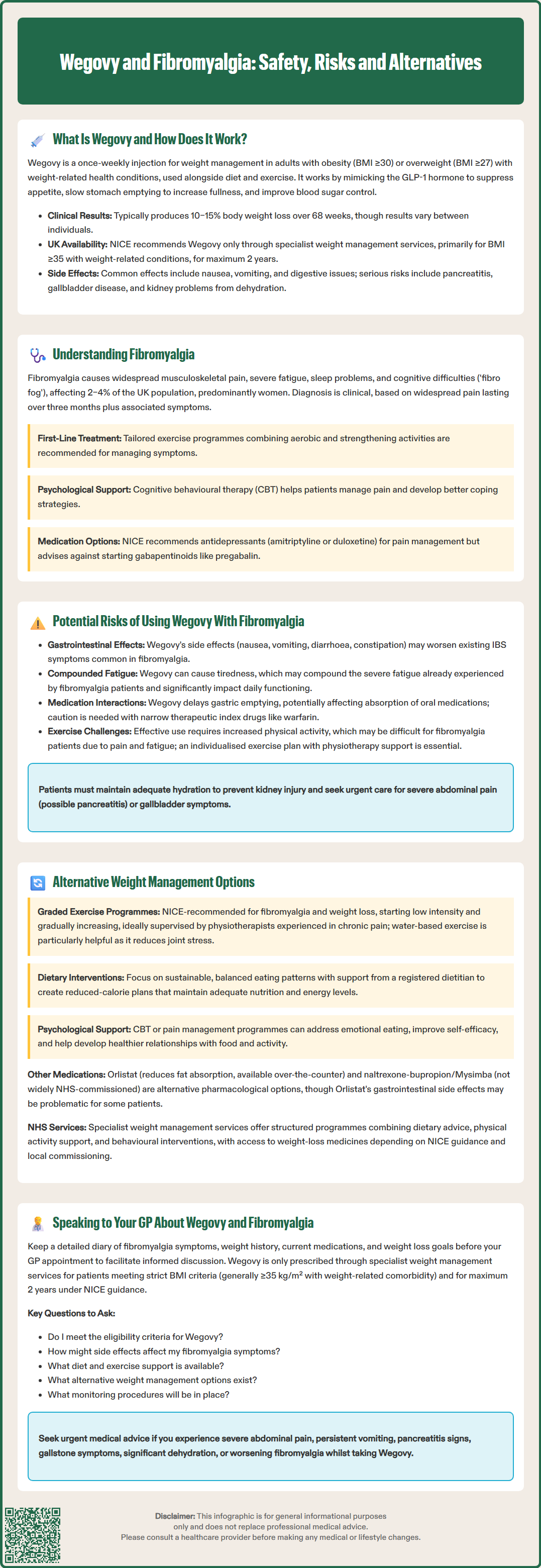
Wegovy (semaglutide 2.4 mg) is a once-weekly injection licensed in the UK for weight management in adults with obesity or overweight with weight-related comorbidities. Fibromyalgia, a chronic condition causing widespread pain, fatigue, and sleep disturbances, affects 2–4% of the UK population and can make weight management particularly challenging. Whilst there is no direct contraindication to using Wegovy in fibromyalgia patients, important considerations exist regarding gastrointestinal side effects, fatigue, and exercise tolerance. This article examines the potential benefits and risks of Wegovy for people with fibromyalgia, alternative weight management strategies, and how to discuss treatment options with your GP in line with NICE guidance.
Quick Answer: Wegovy is not contraindicated in fibromyalgia, but gastrointestinal side effects may worsen existing symptoms and fatigue could be exacerbated.

Mounjaro® is the most innovative GLP-1 medication proven to dramatically curb appetite, hunger, and cravings to help professional men achieve substantial weight loss.
Start Here
Wegovy® is a weekly injectable GLP-1 medication with proven effectiveness in reducing appetite, hunger, and cravings to help busy professionals lose significant weight.
Start HereWegovy (semaglutide 2.4 mg) is a prescription medicine licensed in the UK for weight management in adults with obesity (BMI ≥30 kg/m²) or overweight (BMI ≥27 kg/m²) with at least one weight-related comorbidity, such as type 2 diabetes, hypertension, or obstructive sleep apnoea. It is administered as a once-weekly subcutaneous injection and is intended to be used alongside a reduced-calorie diet and increased physical activity.
Wegovy belongs to a class of medications called glucagon-like peptide-1 (GLP-1) receptor agonists. Semaglutide mimics the action of the naturally occurring hormone GLP-1, which is released by the intestine after eating. The drug works through several mechanisms:
Appetite suppression: It acts on receptors in the brain (particularly in the hypothalamus) to reduce hunger and increase feelings of fullness.
Delayed gastric emptying: Semaglutide slows the rate at which food leaves the stomach, prolonging satiety after meals.
Improved glycaemic control: It enhances insulin secretion in response to elevated blood glucose and reduces inappropriate glucagon release.
Clinical trials (STEP programme) have demonstrated that Wegovy can lead to significant weight loss—typically 10–15% of initial body weight over 68 weeks—when combined with lifestyle modifications, though individual responses vary. The MHRA approved Wegovy in the UK in 2022, and NICE guidance (TA875) supports its use in specific patient groups. According to NICE, Wegovy should only be used within specialist weight management services, generally for people with a BMI ≥35 kg/m² (lower thresholds may apply for some minority ethnic groups) with at least one weight-related comorbidity, and for a maximum duration of 2 years.
Common adverse effects include nausea, vomiting, diarrhoea, constipation, and abdominal pain, which are usually mild to moderate and diminish over time as the dose is gradually increased. Important safety considerations include risks of pancreatitis, gallbladder disease, and dehydration leading to acute kidney injury. Wegovy should not be used during pregnancy or breastfeeding and should be discontinued at least two months before a planned pregnancy.

Fibromyalgia is a chronic condition characterised by widespread musculoskeletal pain, fatigue, sleep disturbances, and cognitive difficulties often referred to as 'fibro fog'. It affects approximately 2–4% of the UK population, with a higher prevalence in women. The exact cause remains unclear, but fibromyalgia is thought to involve abnormal pain processing in the central nervous system, leading to heightened sensitivity to pain signals (central sensitisation).
Key symptoms include:
Widespread pain: Persistent pain affecting multiple body regions, often described as aching, burning, or stabbing.
Fatigue: Profound tiredness that is not relieved by rest.
Sleep problems: Non-restorative sleep, frequent waking, or conditions like restless legs syndrome.
Cognitive impairment: Difficulty concentrating, memory problems, and mental fogginess.
Associated symptoms: Headaches, irritable bowel syndrome (IBS), anxiety, and depression are common comorbidities.
According to NICE guideline NG193 (Chronic pain in over 16s), diagnosis is clinical and based on widespread pain lasting more than three months, along with associated symptoms. A proportionate assessment should be conducted, avoiding unnecessary investigations while remaining vigilant for 'red flags' that might suggest alternative diagnoses (such as persistent joint swelling, unexplained weight loss, night pain, fever, or focal neurological symptoms).
Management is multidisciplinary and focuses on symptom control and improving quality of life:
Exercise programmes: Tailored aerobic and strengthening exercises are first-line interventions.
Psychological therapies: Cognitive behavioural therapy (CBT) and acceptance and commitment therapy can help manage pain and improve coping strategies.
Pharmacological options: NICE recommends considering antidepressants such as amitriptyline or duloxetine for pain management. Notably, NICE advises against initiating gabapentinoids (such as pregabalin) for chronic primary pain, including fibromyalgia, despite their historical use.
Weight management can be challenging for fibromyalgia patients due to pain limiting physical activity, fatigue, and some medications that may contribute to weight gain.
There is currently no official contraindication to using Wegovy in patients with fibromyalgia, and there is no established direct pharmacological interaction between semaglutide and the condition itself. However, several considerations are important when evaluating the suitability of Wegovy for individuals with fibromyalgia.
Gastrointestinal adverse effects are the most common side effects of Wegovy, including nausea, vomiting, diarrhoea, constipation, and abdominal discomfort. For fibromyalgia patients who frequently experience irritable bowel syndrome (IBS) or other gastrointestinal symptoms as part of their condition, these adverse effects may be particularly troublesome and could exacerbate existing symptoms. Careful monitoring during dose escalation is essential.
Fatigue and malaise have been reported with GLP-1 receptor agonists, though less commonly. Given that profound fatigue is a hallmark symptom of fibromyalgia, any additional tiredness from medication could significantly impact quality of life and daily functioning. Patients should be counselled about this possibility and encouraged to report worsening fatigue.
Medication interactions should also be considered. Many fibromyalgia patients take medications such as tricyclic antidepressants or SNRIs (e.g., duloxetine), some of which may contribute to weight gain. While there are no direct drug interactions with semaglutide, the delayed gastric emptying caused by Wegovy can affect the absorption of oral medications. These effects are generally not clinically significant for most medicines, but caution is advised with narrow therapeutic index drugs (e.g., warfarin, where INR monitoring may be appropriate).
Exercise tolerance may be a concern. Wegovy is most effective when combined with increased physical activity, but pain and fatigue in fibromyalgia can limit exercise capacity. A realistic, individualised approach to physical activity is necessary, ideally coordinated with physiotherapy or specialist pain services.
Patients should be advised to maintain adequate hydration to reduce the risk of acute kidney injury and to seek urgent medical attention if they experience severe abdominal pain (which could indicate pancreatitis) or symptoms of gallbladder disease. Any suspected adverse reactions should be reported through the MHRA Yellow Card Scheme.
For individuals with fibromyalgia seeking weight management, a multidisciplinary, personalised approach is essential, taking into account pain, fatigue, and functional limitations. Several evidence-based alternatives to pharmacological interventions like Wegovy may be appropriate.
Graded exercise programmes are recommended by NICE for fibromyalgia management and can also support weight loss. These should be:
Individualised: Starting at a low intensity and gradually increasing to avoid symptom flare-ups.
Varied: Including aerobic activities (walking, swimming, cycling), strengthening exercises, and flexibility work.
Supervised: Ideally delivered by physiotherapists experienced in chronic pain management.
Water-based exercise (hydrotherapy) is often beneficial for many patients, as buoyancy reduces joint stress whilst providing resistance for muscle strengthening, though evidence is supportive but limited.
Dietary interventions should focus on sustainable, balanced eating patterns rather than restrictive diets. Referral to a registered dietitian can help develop a reduced-calorie plan that maintains adequate nutrition and energy levels. Some patients report symptom improvement with anti-inflammatory diets, though evidence is limited.
Psychological support through CBT or pain management programmes can address emotional eating, improve self-efficacy, and help patients develop healthier relationships with food and activity. These interventions are particularly valuable given the high prevalence of anxiety and depression in fibromyalgia.
Other pharmacological options for weight management include:
Orlistat: A lipase inhibitor that reduces fat absorption; available over-the-counter or on prescription. Gastrointestinal side effects may be problematic for some fibromyalgia patients.
Naltrexone-bupropion (Mysimba): Licensed in the UK for weight management, though not widely commissioned within the NHS and without a NICE technology appraisal recommending routine use.
Specialist weight management services commissioned by the NHS may offer structured programmes combining dietary advice, physical activity support, and behavioural interventions tailored to individual needs and comorbidities. Access to weight-loss medicines depends on NICE guidance and local commissioning arrangements.
If you have fibromyalgia and are considering Wegovy for weight management, an open, informed discussion with your GP is essential. Preparation can help ensure a productive consultation.
Before your appointment, consider:
Documenting your symptoms: Keep a diary of fibromyalgia symptoms, including pain levels, fatigue, sleep quality, and how these affect your daily activities and ability to exercise.
Recording your weight history: Note previous weight management attempts, including dietary changes, exercise programmes, and any medications tried.
Listing current medications: Include all prescription medicines, over-the-counter products, and supplements, as these may influence treatment decisions.
Identifying your goals: Be clear about what you hope to achieve with weight loss and how it might improve your fibromyalgia symptoms or overall health.
During the consultation, your GP will likely:
Assess eligibility: According to NICE guidance (TA875), Wegovy is only prescribed for patients meeting specific BMI criteria (generally ≥35 kg/m² with at least one weight-related comorbidity; lower thresholds may apply for some minority ethnic groups), only through specialist weight management services, and for a maximum of 2 years.
Review contraindications: Including hypersensitivity to semaglutide or any excipients. Wegovy should not be used during pregnancy or breastfeeding.
Discuss potential benefits and risks: Including how gastrointestinal side effects might interact with your fibromyalgia symptoms, and risks of pancreatitis, gallbladder disease, and dehydration.
Consider alternatives: Your GP may suggest other approaches better suited to your individual circumstances.
Questions to ask include:
Am I eligible for Wegovy given my BMI and health conditions?
How might Wegovy's side effects affect my fibromyalgia symptoms?
What support is available for diet and exercise modifications?
Are there alternative weight management options more suitable for me?
How will my progress be monitored, and when should I report concerns?
When to seek urgent advice: Contact your GP promptly if you experience severe abdominal pain, persistent vomiting, signs of pancreatitis, symptoms of gallstones, significant dehydration, or significant worsening of fibromyalgia symptoms whilst taking Wegovy. Report any suspected side effects via the MHRA Yellow Card Scheme.
There is no official contraindication to using Wegovy with fibromyalgia, but gastrointestinal side effects may worsen existing symptoms such as irritable bowel syndrome, and fatigue could be exacerbated. Discuss your individual circumstances with your GP to assess suitability.
The most common side effects are nausea, vomiting, diarrhoea, constipation, and abdominal discomfort, which may be particularly troublesome for fibromyalgia patients who often experience irritable bowel syndrome. Additional fatigue, though less common, could worsen existing tiredness.
NICE recommends graded exercise programmes tailored to individual pain and fatigue levels, dietary interventions with dietitian support, psychological therapies such as CBT, and alternative medications like orlistat. Specialist NHS weight management services may offer structured multidisciplinary programmes.
All medical content on this blog is created based on reputable, evidence-based sources and reviewed regularly for accuracy and relevance. While we strive to keep content up to date with the latest research and clinical guidelines, it is intended for general informational purposes only.
DisclaimerThis content is not a substitute for professional medical advice, diagnosis, or treatment. Always consult a qualified healthcare professional with any medical questions or concerns. Use of the information is at your own risk, and we are not responsible for any consequences resulting from its use.